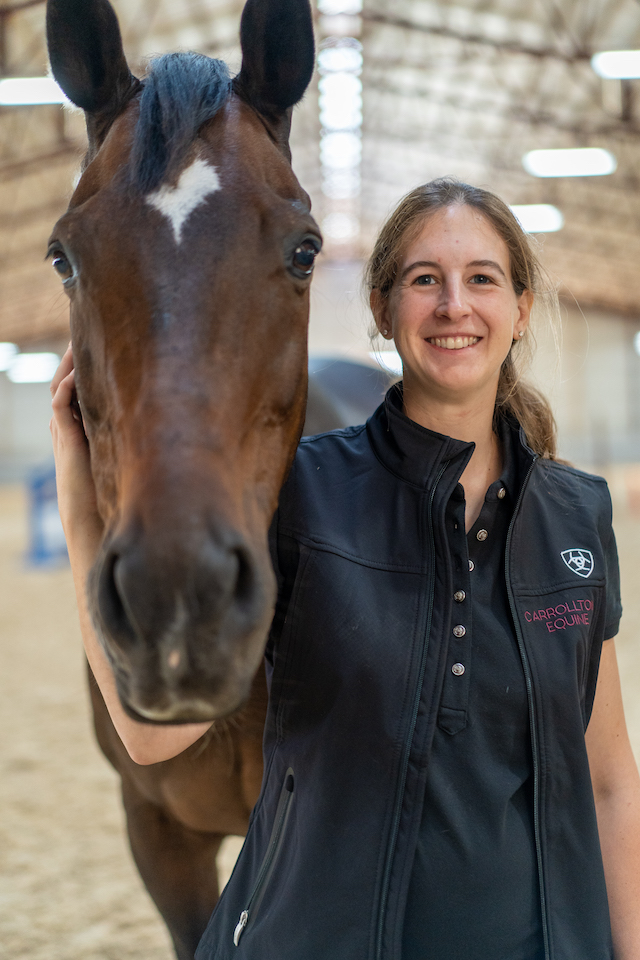Managing Weight and Digestion: The Cornerstones of Equine Health
Learn essential strategies for optimal equine well-being, including balanced diets, regular monitoring, and the use of prebiotics and probiotics. Consult Carrollton Equine for tailored plans and regular check-ups to keep your horse healthy and thriving.
As any seasoned horse owner knows, the health of your horse is as much about managing what they eat as it is about how much they move. At the heart of equine well-being are two fundamental aspects: weight management and digestive health. Mismanagement of either can lead to serious health issues that compromise your horse’s quality of life and ability to perform.
This post will explore essential strategies for maintaining your horse's weight and ensuring their digestive system functions optimally.
Understanding Equine Digestive Health
The equine digestive system is a complex and delicate mechanism uniquely designed to process roughage and utilize nutrients efficiently. Unlike humans, horses have a relatively small stomach but a very long hindgut, which includes the cecum and colon, where fermentation of fibrous plant material occurs. This design means that horses are almost continuous eaters, which necessitates careful dietary management to prevent digestive disturbances such as colic or ulcers.
Weight Management
Assessing your horse's weight regularly is crucial. Body Condition Scoring (BCS) is a practical method that helps owners and veterinarians determine whether a horse is underweight, overweight, or at an ideal weight. Both overweight and underweight horses face health risks. Excess weight can lead to joint stress, increased risk of laminitis, and metabolic disorders, whereas underweight horses might suffer from malnutrition and reduced performance.
Strategies for Optimal Weight
- Regular Monitoring: Use a weight tape and body condition scoring once a month to keep track.
- Balanced Diet: Ensure your horse's diet is balanced with the right mix of forage, grains, and supplements based on their specific energy requirements.
- Exercise: Regular exercise is essential to maintain healthy weight and overall fitness.
Diet Adjustments for Weight Management
Changing a horse’s diet must be done gradually to avoid shocking their sensitive digestive system. When adjusting the diet for weight management:
- Increase or decrease caloric intake slowly, depending on whether you need to promote weight gain or loss.
- Adjust feed types: For weight gain, increase high-quality forage and consider energy-dense supplements. For weight loss, reduce grain portions and increase low-calorie roughage.
- Exercise: Incorporate a consistent exercise regimen that aligns with the horse's dietary intake.
Digestive Aids and Their Role
Digestive aids like prebiotics and probiotics can play a significant role in maintaining gut health. These supplements support the beneficial bacteria in the horse’s gut, which helps in the efficient breakdown and absorption of nutrients.
- Prebiotics feed the good bacteria in the gut, enhancing the gut flora.
- Probiotics add live bacteria to the digestive system, promoting a balanced intestinal environment.
- When to Use: These should be considered when there are changes in diet, during antibiotic treatment, or when the horse is under stress, all of which can disrupt gut flora.
Routine Health Checks
Regular check-ups by a veterinarian are essential to catch and address any health issues early. These checks should include:
- Fecal exams to check for worms and parasites.
- Dental care to ensure that the horse is able to chew properly, which is crucial for digestion.
- Weight monitoring and nutritional assessments to tailor dietary needs as the horse ages or its activity level changes.
Conclusion
Understanding and managing your horse's weight and digestive health are not just about keeping them disease-free; it's about ensuring they lead a long, happy, and active life. We encourage you to book a consultation with Carrollton Equine to develop a tailored plan that ensures your horse remains in top condition. Regular health checks are not just a preventative measure but a critical component of loving and responsible horse care.
Contact us today to schedule your horse's next health check and start a conversation about a diet and exercise plan that suits their unique needs. Let’s keep your equine companion healthy and thriving together!

About The Author
Nicole Kelleher
DVM, CVA, VSMT | Owner & Equine Veterinarian
Nicole graduated from The Ohio State University College of Veterinary Medicine in 2014. Since then she has continued to further her education by becoming a Certified Veterinary Acupuncturist graduating from the Chi Institute in 2017. She then attended the Healing Oasis school to graduate with her degree in Veterinary Spinal Manipulative Therapy (VSMT) in 2021. Dr. Kelleher regularly sees clients utilizing Shenanigans Stables to perform lameness evaluations and treat patients with both acupuncture and VSMT allowing for an integrative approach to the equine athlete.
